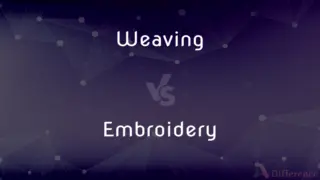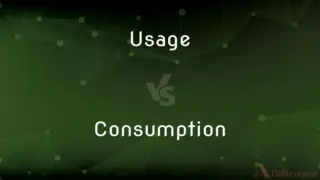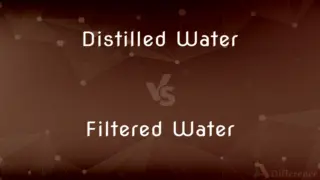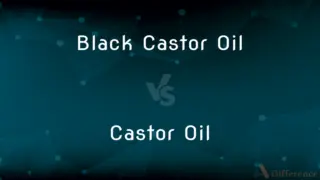Grass vs. Lettuce — What's the Difference?
By Fiza Rafique & Urooj Arif — Updated on April 15, 2024
Grass refers broadly to plants with narrow leaves, grown naturally in fields, whereas lettuce is a cultivated leafy green used mainly in salads.

Difference Between Grass and Lettuce
Table of Contents
ADVERTISEMENT
Key Differences
Grass encompasses a wide range of plants in the Poaceae family, commonly used in lawns and fields, while lettuce, belonging to the Asteraceae family, is specifically grown for consumption.
Grass thrives in diverse environments and serves as a staple for grazing animals, whereas lettuce is cultivated under controlled agricultural conditions primarily for human food.
Grass is typically more resilient and grows back even after being cut down, whereas lettuce might not regrow after harvest, depending on the variety.
Cultivation of grass spans various purposes from landscaping to feedstock, on the other hand, lettuce is cultivated mainly for its edible leaves.
Comparison Chart
Family
Poaceae
Asteraceae
ADVERTISEMENT
Usage
Lawns, feedstock, sports fields
Human consumption, mainly in salads
Growth Condition
Adaptable to many environments
Requires controlled agricultural settings
Regrowth Capability
Often regrows after cutting
May not regrow after harvest
Nutritional Value
Lower, mostly fiber
Higher, rich in vitamins A and K
Compare with Definitions
Grass
A plant with narrow leaves growing from the soil in a yard or field.
The grass in our backyard needs cutting every two weeks.
Lettuce
The state of being fresh and crisp, similar to well-kept lettuce.
Keep the lettuce in the fridge to keep it fresh.
Grass
Slang for betraying someone, especially by informing the authorities.
He was reluctant to grass on his colleagues.
Lettuce
A leafy green vegetable, commonly used in salads and sandwiches.
I added some lettuce to my sandwich for extra crunch.
Grass
Any plant of the family Poaceae, used for food, fodder, and ground cover.
Farmers rotate their crops between corn and grass to maintain soil health.
Lettuce
Any plant of the genus Lactuca, cultivated for its leaves.
Lettuce is easier to grow in cool weather.
Grass
Informal term for marijuana.
Grass is legal in some states but remains federally illegal.
Lettuce
Informal term for money, specifically paper currency.
He flashed some lettuce to show off his new wealth.
Grass
A surface covered with grass used for sports or recreation.
The football game was postponed due to waterlogged grass.
Lettuce
A symbol of freshness in culinary contexts.
The chef uses lettuce to add a fresh element to his dishes.
Grass
A member of the grass family.
Lettuce
Lettuce (Lactuca sativa) is an annual plant of the daisy family, Asteraceae. It is most often grown as a leaf vegetable, but sometimes for its stem and seeds.
Grass
The members of the grass family considered as a group.
Lettuce
Any of various plants of the genus Lactuca of the composite family, especially L. sativa, cultivated for its edible leaves.
Grass
Any of various plants having slender leaves similar to those of a grass.
Lettuce
The leaves of L. sativa, used especially in salads.
Grass
Ground, as on a lawn, that is covered with grass or similar plants.
Lettuce
(Slang) Paper money.
Grass
Grazing land; pasture.
Lettuce
An edible plant, Lactuca sativa and its close relatives, having a head of green and/or purple leaves.
Grass
(Slang) Marijuana.
Lettuce
(uncountable) The leaves of the lettuce plant, eaten as a vegetable; as a dish often mixed with other ingredients, dressing etc.
I’ll have a ham sandwich with lettuce and tomato.
Grass
(Electronics) Small variations in amplitude of an oscilloscope display caused by electrical noise.
Lettuce
United States paper currency; dollars.
Twenty dollars an hour? That's a lot of lettuce!
Grass
Chiefly British Slang An informer.
Lettuce
A strong yellow-green colour, like that of lettuce (also called lettuce green).
Grass
To cover with grass.
Lettuce
Weed or marijuana
Grass
To grow grass on.
Lettuce
Long hair, as worn by an exemplar of bro culture
Grass
To feed (livestock) with grass.
Lettuce
A composite plant of the genus Lactuca (Lactuca sativa), the leaves of which are used as salad. Plants of this genus yield a milky juice, from which lactucarium is obtained. The commonest wild lettuce of the United States is Lactuca Canadensis.
Grass
To become covered with grass.
Lettuce
United States currency; dollar bills; greenbacks.
Grass
To graze.
Lettuce
Informal terms for money
Grass
Any plant of the family Poaceae, characterized by leaves that arise from nodes in the stem and leaf bases that wrap around the stem, especially those grown as ground cover rather than for grain.
Lettuce
Any of various plants of the genus Lactuca
Grass
(countable) Various plants not in family Poaceae that resemble grasses.
Lettuce
Leaves of any of various plants of Lactuca sativa
Grass
(uncountable) A lawn.
Grass
Marijuana.
Grass
An informer, police informer; one who betrays a group (of criminals, etc) to the authorities.
What just happened must remain secret. Don't be a grass.
Grass
Sharp, closely spaced discontinuities in the trace of a cathode-ray tube, produced by random interference.
Grass
Noise on an A-scope or similar type of radar display.
Grass
The season of fresh grass; spring or summer.
Grass
That which is transitory.
Grass
Asparagus; "sparrowgrass".
Grass
(mining) The surface of a mine.
Grass
(transitive) To lay out on the grass; to knock down (an opponent etc.).
Grass
To act as a grass or informer, to betray; to report on (criminals etc) to the authorities.
Thesaurus:rat out
Grass
(transitive) To cover with grass or with turf.
Grass
(transitive) To feed with grass.
Grass
(transitive) To expose, as flax, on the grass for bleaching, etc.
Grass
(transitive) To bring to the grass or ground; to land.
Grass
Popularly: Herbage; the plants which constitute the food of cattle and other beasts; pasture.
Grass
An endogenous plant having simple leaves, a stem generally jointed and tubular, the husks or glumes in pairs, and the seed single.
Grass
The season of fresh grass; spring.
Two years old next grass.
Grass
Metaphorically used for what is transitory.
Surely the people is grass.
Grass
Marijuana.
Grass
To cover with grass or with turf.
Grass
To expose, as flax, on the grass for bleaching, etc.
Grass
To bring to the grass or ground; to land; as, to grass a fish.
Grass
To produce grass.
Grass
Narrow-leaved green herbage: grown as lawns; used as pasture for grazing animals; cut and dried as hay
Grass
German writer of novels and poetry and plays (born 1927)
Grass
Animal food for browsing or grazing
Grass
Street names for marijuana
Grass
Shoot down, of birds
Grass
Cover with grass;
The owners decided to grass their property
Grass
Spread out clothes on the grass to let it dry and bleach
Grass
Cover with grass
Grass
Feed with grass
Grass
Give away information about somebody;
He told on his classmate who had cheated on the exam
Common Curiosities
Is lettuce nutritious?
Yes, lettuce is rich in vitamins A and K, and provides dietary fiber.
How often should you water lettuce?
Lettuce needs to be watered regularly to maintain moist, not waterlogged, soil.
What type of lettuce is most popular for salads?
Romaine and iceberg lettuce are among the most popular for salads.
What are the benefits of including lettuce in your diet?
Lettuce offers hydration, fiber, and essential nutrients, beneficial for digestion and health.
Is grass edible for humans?
While grass is not generally consumed by humans, it is edible and nutritious for many animals.
What climates are suitable for growing lettuce?
Lettuce prefers cooler climates and may bolt or wilt in high heat.
Can you grow lettuce at home?
Yes, lettuce can be easily grown in home gardens or containers.
What are the different types of grass?
Common types include Bermuda, St. Augustine, and Kentucky bluegrass.
How do you maintain a healthy lawn of grass?
Regular mowing, watering, and fertilizing are essential for a healthy grass lawn.
What are the primary uses of grass?
Grass is primarily used for lawns, pastures, and sports fields.
How quickly does grass grow?
Growth rates vary, but grass can grow quickly, especially in favorable conditions.
What pests commonly affect grass?
Common pests include grubs, beetles, and various types of fungi.
Can lettuce be used in cooking?
Yes, while commonly used raw, lettuce can also be grilled or added to soups.
Share Your Discovery

Previous Comparison
Daddy vs. Papa
Next Comparison
Postulate vs. AssumptionAuthor Spotlight
Written by
Fiza RafiqueFiza Rafique is a skilled content writer at AskDifference.com, where she meticulously refines and enhances written pieces. Drawing from her vast editorial expertise, Fiza ensures clarity, accuracy, and precision in every article. Passionate about language, she continually seeks to elevate the quality of content for readers worldwide.
Co-written by
Urooj ArifUrooj is a skilled content writer at Ask Difference, known for her exceptional ability to simplify complex topics into engaging and informative content. With a passion for research and a flair for clear, concise writing, she consistently delivers articles that resonate with our diverse audience.















































